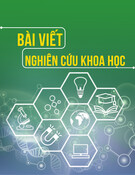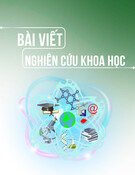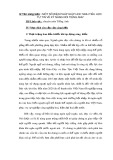
99
SERVICE-LEARNING ACTIVITIES OF PRE-SERVICE PRIMARY
SCHOOL TEACHERS: PERCEPTIONS OF COMMUNITY
MEMBERS
Truong Thi Ngoc Linh; Phan Do Quynh Tram
University of Foreign Languages and International Studies, Hue University
truongthingoclinh789@gmail.com
(Received: 09/01/2024; Revised: 20/02/2024; Accepted: 03/04/2024)
Abstract: This study explored community members’ perceptions of service-learning (SL)
activities of pre-service primary school teachers (PSTs) of a university in Vietnam. More
specifically, the study aimed at investigating how community members (CMs) perceive the
impacts of SL activities organized at primary school settings on primary school students and
the professional development of PSTs. To collect data for the study, multiple interviews were
conducted with primary school leaders (Ls) and primary school teachers (Ts) at three primary
schools (PSs), who were directly involved in the SL activities of the PSTs. The findings
revealed SL activities were believed to positively impact PSTs’ professional development
through providing opportunities for context-based learning, and pedagogical knowledge and
skill development. CM also believed that SL activities improved primary students’
engagement, motivation, and confidence in English learning. The paper provides
implications for teacher educators and school managers.
Keywords: service-learning activities, community members, perceptions, pre-service
primary school teachers, Vietnam
1. Introduction
In recent years, there has been a growing interest in service learning (SL) as an
educational strategy across various academic disciplines (Geller et al. 2016). SL, rooted in the
concept of experiential learning introduced by Dewey (1938), offers learners the opportunity to
apply theoretical knowledge in practical settings. In an age of globalization, tertiary education’s
role in shaping a quality workforce has amplified the importance of SL in higher educational
institutions (Marginson & Wende, 2006).
SL is believed to have immense potential for enhancing student learning and personal
development, fostering critical thinking skills, and nurturing an appreciation for human diversity
(Barnes & Caprino, 2016; Glazier et al., 2014). Within the field of teacher education, research
has shown SL plays a vital role in equipping pre-service teachers (PSTs) with practical skills to
enrich their teaching practices (Smolen et al., 2013), significantly impacting their professional
development (Burgess et al., 2010). SL is, therefore, considered as a bridge between universities
and communities, as it enhances the effectiveness of teacher training and contributes to
community development (Gelmon et al., 2001).
While studies have highlighted the benefits of SL for students (Mark, 1993; Gray, 2000),
most studies have focused on students’ perspectives, often overlooking the viewpoint of
community members (CMs) who actively involved in SL projects (Blouin & Perry, 2009;
Mogford & Lyons, 2019). In the Vietnamese context, little research has focused on CMs’

100
perceptions of SL. This dearth of community perspectives can result in limited objectivity when
assessing the effectiveness of SL activities. Understanding CMs’ perceptions is crucial for
designing and implementing meaningful SL initiatives that benefit both PSTs and the
communities they serve. The present study responds to this urgent need by investigating CM’s
perceptions of impacts of SL activities organized at Vietnamese primary school settings by PSTs
of a teacher training program in Central Vietnam on primary school students (Ss) and on pre-
service primary school teachers’ (PST) professional development. This study, therefore, is
conducted to address the following research questions:
1. From community members’ perspective, what are the impacts of SL activities on primary
school students?
2. From community members’ perspective, what are the impacts of SL activities on pre-service
primary school teachers’ professional development?
2. Literature review
2.1 Service learning
Service learning (SL) is an educational strategy rooted in the principle of “reciprocal
learning,” as described by Robert Sigmon (1979). This approach emphasizes that both those who
serve and those who receive service should benefit from the experience, as learning emerges from
service activities. Crucially, SL occurs when both service providers and recipients gain
knowledge through the experience. This reciprocal learning aspect is at the core of SL, as
highlighted by Jacoby (1996) and Pompa (2002).
However, the term “service learning” has been applied to a wide range of experiential
education activities. John Dewey (1938) initially introduced the concept of “experiential
learning”. It is, as defined by Gentry (1990), considered as a “participative, interactive, and
applied approach”, enabling interaction with the environment in highly variable and uncertain
situations, and encompassing learning on affective, behavioral, and cognitive dimensions.
Importantly, it necessitates a structured experience with defined learning goals, ongoing
supervision, assessment based on theory, and continuous process feedback.
This research study is developed in the light of Sigmon’s (1979) definition of SL as
reciprocal learning, emphasizing that both PSTs and Ss benefit from the experience. Furthermore,
SL activities are integrated into academic curricula to address genuine community needs, offering
students opportunities for experiential learning with structured experiences, defined learning
goals, ongoing supervision, assessment based on theory, and continuous process feedback
(Gentry, 1990).
2.2 Service learning in teacher education
SL has emerged as a dynamic educational approach that transcends the boundaries of
traditional education, connecting classroom learning with real-world application. This paradigm
shift emphasizes experiential learning, fostering a deeper understanding of subject matter by
immersing learners in practical contexts (Dewey, 1938; Kesten, 2012; Lave & Wenger, 1991).
Particularly relevant to the field of teacher education, SL has gained recognition for its potential

Tạp chí Khoa học Ngôn ngữ và Văn hóa
ISSN 2525-2674
Tập 8, số 1, 2024
101
to shape PSTs into well-rounded professionals equipped with not only theoretical knowledge but
also hands-on skills and community awareness (Eyler & Giles, 1999).
At the core of SL lies the concept of reciprocal learning, where PSTs’ education is
intertwined with community needs. This approach transcends the notion of education as a
unidirectional transfer of knowledge, instead positioning it as a collaborative endeavor (Gelmon,
2001). In essence, SL goes beyond conventional classroom by integrating community
engagement into the learning process. This integration nurtures a symbiotic relationship where
PSTs engage in meaningful activities that benefit both their learning journey and the community
they serve (Kesten, 2012; Williams, 2009).
SL additionally demonstrates to be in line with a recent shift in the theory and practice of
second/foreign language teacher education (Johnson, 2006). In this shift, learning to teach is
described as a long-term complex development process that stems from participation in social
practices and settings associated with learning, emphasizing how teacher education has changed
from cognitive to social processes. In the field of L2 learning, SL has gained growing attention
from administrators and language educators because it offers language teachers and learners a
chance of contextualizing the target language and facilitating authentic language use (Guariento
& Morley, 2001).
2.3 Community involvement in service learning
Collaborative relationships between institutions are vital for successful SL projects, for
collaborative partnerships ensure that SL activities are contextually relevant, impactful, and
sustainable (Sandy & Holland, 2006). Moreover, shared learning experiences are central to
community-university partnerships, in which enriching CMs, university educators, and students
engage in a process of collective knowledge-building that enriches the educational experience for
all involved parties (Lave & Wenger, 1991). In particular, university-community collaborations
are now understood to be connected to SL initiatives for delivering the SL experience to university
students and assessing its effectiveness (Bailis, 2002; Dorado & Giles, 2004; Gelmon et al., 1998).
Therefore, it is challenging to envision how SL could possibly exist in the absence of community
involvement. More importantly, as CMs are also required to devote a considerable amount of time
to community engagement and SL projects that involve the planning, implementation and
evaluation of projects (Conville & Kinnell, 2010; Schwartz & Fontenot, 2007), it is crucially
imperative for their perceptions to be heard in order to assess the effectiveness of SL projects
more objectively.
2.4 Related Studies
Exploration of CMs’ perceptions of SL has garnered attention in various international
contexts (Gerstenblatt, 2014; Jodaan & Mennega, 2022; Petri, 2015; Rinaldo etal., 2015; Sandy
& Holland, 2006), offering insightful glimpses into the dynamics of community engagement. In
a qualitative study with 99 experienced community partners across various California
communities, Sandy and Holland (2006) reported that community partners emphasized the
importance of valuing and nurturing campus-community partnership relationships, their
dedication to educating college students, and the transformative potential of campus-community
partnerships.

102
In a different setting of Portland, a study conducted by Gerstenblatt (2014) explored the
lived experience of nine CMs of various positions of different organizations working with
university SL classes. The findings from questionnaires and interviews highlighted the benefits
of SL for both college students and community partners, and the importance of the university’s
recognition and support of SL.
In another study with 24 community partners in America, who were interviewed to
evaluate how reciprocity works in higher education SL, Petri (2015) reported that relationships
with university students encouraged CMs to engage in community projects, inspired CMs to try
new things and be more proactive, promoted community learning, and left a long-lasting impact
on students in the community. In a similar context, Rinaldo and colleagues conducted a study of
nine key community partners from different organizations through interviews to examine the
value of SL projects to community partners. They found that community partners valued
consistent faculty involvement and early engagement through orientations for effective and
valuable experiences. Community partners noted direct benefits, such as volunteer support and
expertise, and highlighted the impact on achieving organizational missions and students’ learning
and development, while also acknowledging challenges related to student’' time management and
planning.
In South Africa, an investigation into the self-perceived role of 36 community partners
in a community engagement module was conducted Jodaan and Mennega (2022) using both
questionnaires and interviews. It emphasized the development of work-related skills in university
students through community projects. The involvement of the university and clear
communication were identified as key factors in successful partnerships.
In the Vietnamese context, research on SL remains limited. While a few studies exist,
they predominantly focus on investigating the perceptions and attitudes of Vietnamese EFL
teachers and students regarding SL. For instance, Truong et al. (2020) conducted a study
involving 61 teachers and 201 students at a foreign language university in central Vietnam. Their
research explored perceptions of SL, the role of the school, benefits for teachers and students, and
the feasibility of integrating SL. The findings demonstrated strong support among both teachers
and students for SL as a valuable tool to promote personal, academic, and professional growth.
In another study by Truong et al. (2023), 78 fourth-year English pedagogy students were
examined following their participation in an SL-integrated teaching practicum unit within EFL
community classes. The results revealed that all students held favorable attitudes towards SL and
the teaching practicum unit, which positively influenced their personal development, classroom
management skills, professional growth, and community engagement. However, regarding
studies examining community members’ perceptions of SL, there is little research conducted to
explore this issue in the Vietnamese context.
It can be noticed that existing research in international contexts has provided valuable
insights into community engagement in SL, most of which involved community partners from a
wide range of organizations and of different disciplines. The diversity of organizations and
disciplines might have led to varying expectations, experiences, and perceived value. Previous
studies have taken a broader perspective or focused on different educational fields, leaving the

Tạp chí Khoa học Ngôn ngữ và Văn hóa
ISSN 2525-2674
Tập 8, số 1, 2024
103
field of teacher education thoroughly unexplored. Moreover, in Vietnamese contexts, little is
known on the perceptions of CMs on impacts of SL activities of PSTs in the field of ELT.
Therefore, a notable gap remains regarding the perceptions of CMs specifically in the realm of
PSTs’ SL activities in the field of ELT. This study was conducted with the hope of filling this
gap.
3. Methodology
3.1 Research design
The research was conducted exclusively qualitatively, employing semi-structured
interviews in which the researcher asked open-ended questions. This approach was chosen since
one of its significant characteristics is to examine a problem and deepen a detailed understanding
of a central phenomenon (Creswell, 2012), and to supply researchers with real, rich and deep data
(Larsen-Freeman & Long, 1991). The use of open-ended questions in semi-structured interviews
could facilitate the collection of rich, authentic, and context-specific data as CMs were enabled
to freely articulate their experiences, opinions, and feelings in, which are not constrained by
predefined response options (Adams, 2015). Moreover, as little research exists on CMs’
perspectives of SL, qualitative research can be useful for offering a greater degree of flexibility,
in which “the data collection and analysis process can be adapted as new ideas or patterns
emerge”, in order to “uncover novel problems or opportunities that researchers wouldn’t have
thought of otherwise” (Bhandari, 2023).
3.2 Research setting
The study focused on three local primary schools (PSs) in a city located in Central
Vietnam. These schools have cooperated with a department of English of a university of foreign
languages to organize SL activities for the last two or three years. Each year, groups of PSTs of
this department, volunteering to participate in SL projects have been sent to these schools in the
first semester to support PSs to organize English-related activities (extracurricular activities)
aimed at fostering an English learning environment for primary school students (Ss) of Grade
3,4,5 under the guidance of primary school leaders (Ls) and primary school teachers (Ts) of the
three PSs. PSTs were asked to design extracurricular activities whose topics were in line with the
unit Ss were learning in the textbook or aligned with weekly topics of the PSs. This project often
lasted 7-8 weeks. Each week, PSTs would visit Ps two or three times to hold different English-
related activities for Ss during twenty-minute breaks, or private sessions on Friday afternoon, or
formal classes. Maximum commitment time per PST would be 2-3 hours per week. PSTs were
assessed in terms of community service attitudes and teaching performance.
3.3 Research participants
Initially, the researcher proactively contacted Ls of several local PSs via emails which
were provided by teacher educators (TEs) who have worked directly with Ls of the PSs in
planning SL projects in recent years. The email provided detailed information of the research,
including the objectives of the study, the nature of participation, and the expected time for
interviews, and asked for permission to conduct interviews with Ls and Ts for their perceptions
of SL activities of PSTs. Three Ts responded to the email, expressing their willingness to take
part in the research. After that, the three Ls, who were familiar with the SL projects and the roles




![Bộ đề trắc nghiệm Tiếng Anh lớp 5 [mới nhất]](https://cdn.tailieu.vn/images/document/thumbnail/2020/20200529/le_1307/135x160/471590714638.jpg)
![Tổng Hợp Ngữ Pháp Tiếng Anh Lớp 9 [Chuẩn Nhất]](https://cdn.tailieu.vn/images/document/thumbnail/2020/20200120/nanhk4/135x160/6881579527087.jpg)


![Đề thi học kì 2 môn Tiếng Anh Lớp 4 [năm học] mới nhất](https://cdn.tailieu.vn/images/document/thumbnail/2016/20160730/uclamhunglevinhtranl/135x160/2961469864777.jpg)
![500 câu trắc nghiệm Tiếng Anh lớp 9 [Kèm đáp án chi tiết]](https://cdn.tailieu.vn/images/document/thumbnail/2016/20160726/nxuanchinh27/135x160/1636584746.jpg)


![Tài liệu Từ vựng tiếng Anh Trung cấp [mới nhất]](https://cdn.tailieu.vn/images/document/thumbnail/2025/20250913/nguyentuan250421@gmail.com/135x160/99491757910839.jpg)
![Tài liệu Từ vựng Tiếng Anh theo chủ đề [mới nhất]](https://cdn.tailieu.vn/images/document/thumbnail/2025/20250913/namdhuet@gmail.com/135x160/83251757753810.jpg)



![Tài liệu Từ vựng tiếng Anh cho bé [chuẩn nhất/mới nhất]](https://cdn.tailieu.vn/images/document/thumbnail/2025/20250731/huadaithesang2509@gmail.com/135x160/18631754013896.jpg)








